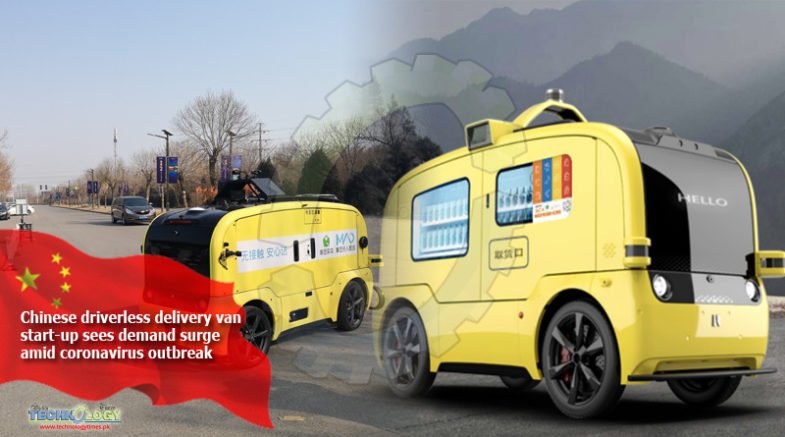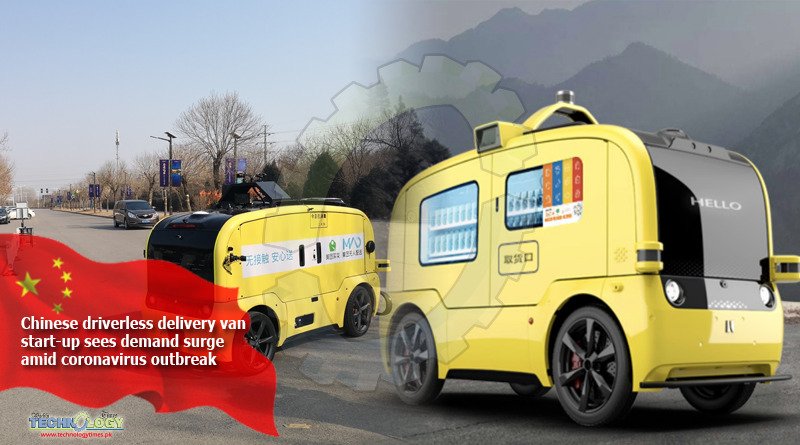The start-up, which has attracted customers including Alibaba, Meituan and JD.com, has booked orders for more than 200 vehicles in the past two months Local authorities are offering incentives to fund purchase and operation of driverless delivery vans in their jurisdictions for up to 60 per cent of the tag price. The coronavirus has hurt many companies in China and around the world

. Neolix, a driverless delivery business based in Beijing, is not among them – in fact, it has seen a jump in demand.
The start-up, which has attracted customers including Alibaba Group, Meituan Dianping and JD.com, has booked orders for more than 200 vehicles in the past two months; before then, it had only produced 125 units since manufacturing began last May, founder Yu Enyuan said in an interview.
Amid the virus anxiety that has disrupted businesses and supply chains, China’s push into autonomous transport and the future of delivery is getting an unexpected boost. Neolix’s small vans help customers reduce physical contact and address labour shortages caused by lingering quarantines and travel restrictions.
Neolix’s inventories have been depleted during the epidemic as its vehicles have been used to deliver medical supplies in hospitals, including in Wuhan, at the outbreak’s epicentre. Its vans are also being used to help disinfect streets and move food to people who are working on the front lines to curb the spread of the virus, Yu said.
“Demand has been surging since the virus outbreak and more importantly, people’s perception toward driverless delivery had a complete 180-degree shift,” Yu said. “People realise that such vehicles can get things done when it is risky for a human being to do so.”
Billionaire Jack Ma three years ago forecast China would have one billion deliveries a day within a decade and that commercialisation of driverless-courier technology could provide lessons for autonomous vehicles carrying passengers. Yet there have been restrictions for such vehicles to be used on open roads. During the unprecedented virus outbreak, regulatory barriers are being eased, as roads are empty.
“China’s digital services economy has prospered during the crisis as people shifted to online consumption,” said Bill Russo, CEO of consulting firm Automobility. “This will accelerate the commercialisation of autonomous service delivery solutions. Neolix and others stand to benefit.”INSIDE CHINA TECH NEWSLETTERGet updates direct to your inboxSUBSCRIBEBy registering, you agree to our T&C and Privacy Policy
Local authorities in China are offering incentives to fund purchase and operation of driverless delivery vans in their jurisdictions for up to 60 per cent of the tag price, according to Yu. The government subsidies will speed up promotion of the vehicles, according to the company, which expects to sell 1,000 units this year.
“The industry has entered into a fast expansion phase because of the virus,” Yu said.
The development of autonomous vans is accelerating not only in China. Delivery robot company Nuro, Neolix’s rival in the US, won the first federal safety approval for a purpose-built, self-driving vehicle last month, paving the way for its plans to deliver groceries autonomously in neighbourhoods. The approval, valid for two years, indicates that regulators at the Department of Transportation think specially built robot cars can start taking to the roads in the US
“It is great advancement for all companies developing such delivery vehicles,” Yu said.
Yet some industry observers are more cautious about the near-term prospects. China’s relatively low labour costs may undermine promotion of autonomous delivery for some time, said Cui Dongshu, secretary general of the China Passenger Car Association, who sees the current demand as temporary.
Russo, the consultant, said he thinks the order uptick for companies like Neolix will translate to future demand as well.
Courtsy: Refferal link
